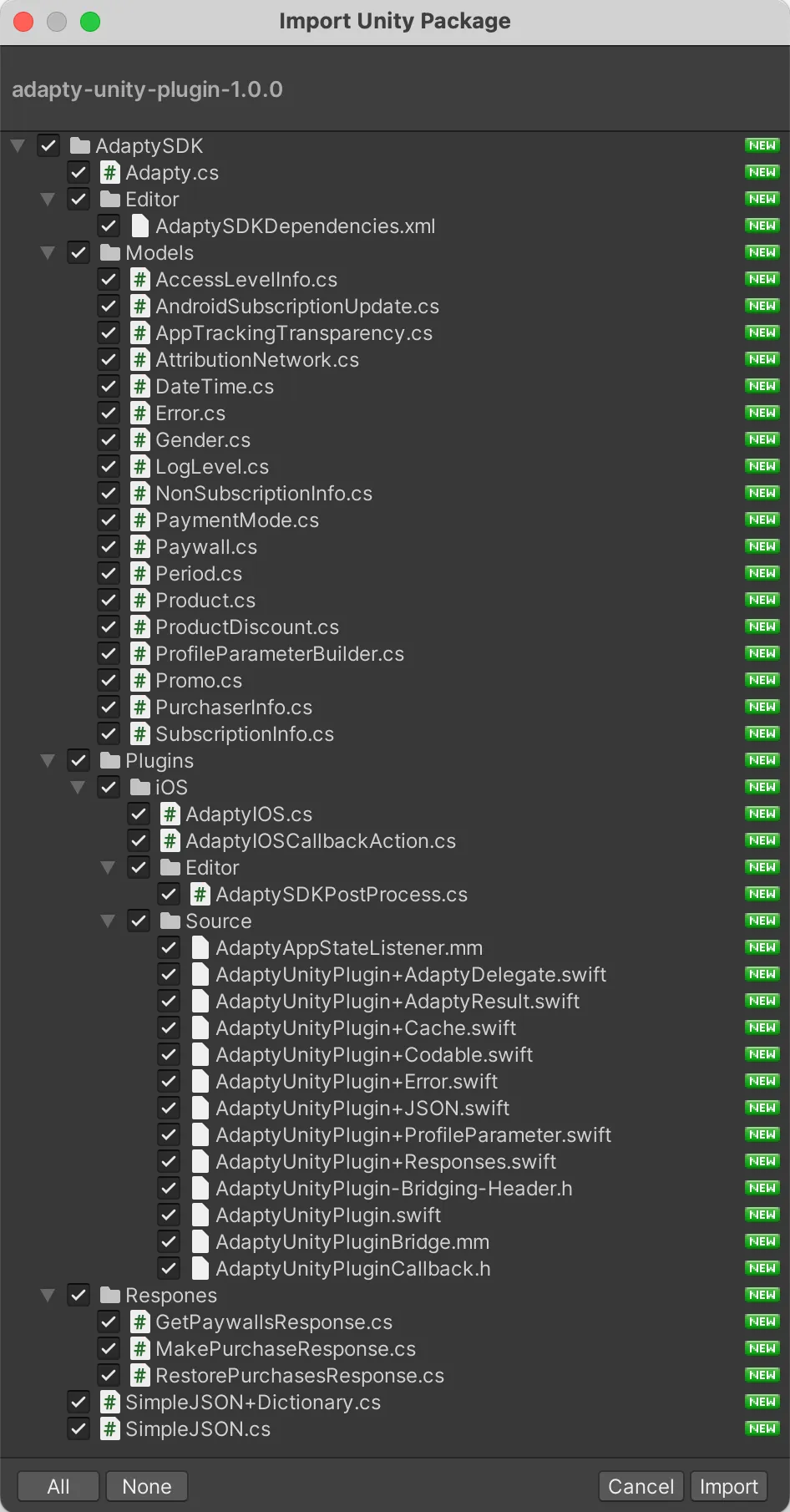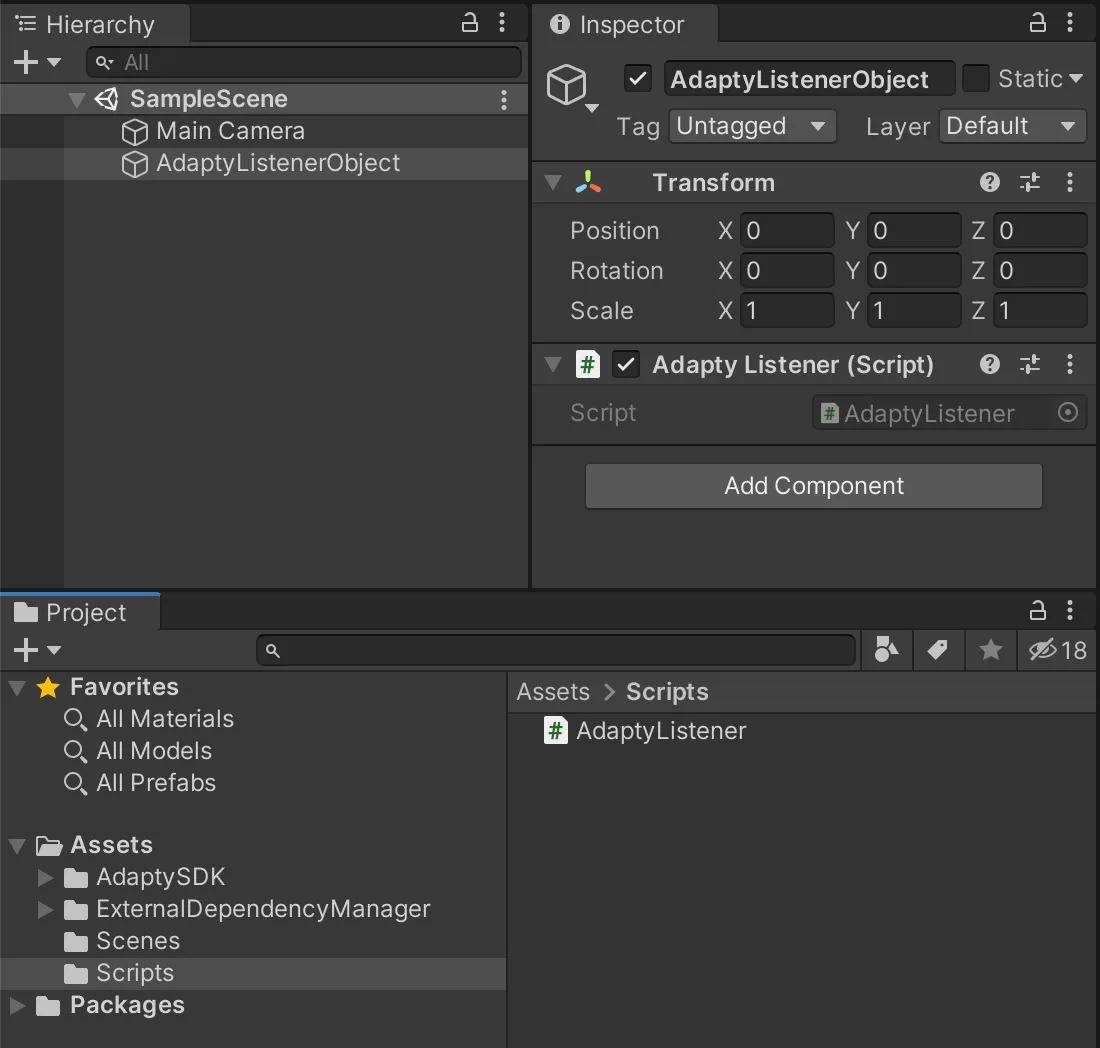Install & configure Unity SDK
Adapty SDK includes two key modules for seamless integration into your Unity app:
- Core Adapty: This essential SDK is required for Adapty to function properly in your app.
- AdaptyUI: This optional module is needed if you use the Adapty Paywall Builder, a user-friendly, no-code tool for easily creating cross-platform paywalls.
Want to see a real-world example of how Adapty SDK is integrated into a mobile app? Check out our sample app, which demonstrates the full setup, including displaying paywalls, making purchases, and other basic functionality.
Requirements
Adapty SDK supports iOS 13.0+, but requires iOS 15.0+ to work with paywalls created in the paywall builder.
Adapty is compatible with Google Play Billing Library up to 8.x. By default, Adapty uses Google Play Billing Library v7.0.0. To use a newer version, override the Billing dependency in your Android build.
Installing the SDK is step 5 of the Adapty setup. Before purchases work in your app, you also need to connect your app to the stores, then create products, a paywall, and a placement in the Adapty Dashboard. The quickstart guide walks through all required steps.
Install Adapty SDK
- Download the
adapty-unity-plugin-*.unitypackagefrom GitHub and import it into your project.

-
Download and import the External Dependency Manager plugin.
-
The SDK uses the “External Dependency Manager” plugin to handle iOS Cocoapods dependencies and Android gradle dependencies. After the installation, you may need to invoke the dependency manager:
Assets -> External Dependency Manager -> Android Resolver -> Force Resolveand
Assets -> External Dependency Manager -> iOS Resolver -> Install Cocoapods -
When building your Unity project for iOS, you would get
Unity-iPhone.xcworkspacefile, which you have to open instead ofUnity-iPhone.xcodeproj, otherwise, Cocoapods dependencies won’t be used.
Activate Adapty module of Adapty SDK
Activate the Adapty SDK in your app code.
The Adapty SDK only needs to be activated once in your app.
To get your Public SDK Key:
- Go to Adapty Dashboard and navigate to App settings → General.
- From the Api keys section, copy the Public SDK Key (NOT the Secret Key).
- Replace
"YOUR_PUBLIC_SDK_KEY"in the code.
- Make sure you use the Public SDK key for Adapty initialization, the Secret key should be used for server-side API only.
- SDK keys are unique for every app, so if you have multiple apps make sure you choose the right one.
using UnityEngine;
using AdaptySDK;
public class AdaptyListener : MonoBehaviour, AdaptyEventListener {
void Start() {
DontDestroyOnLoad(this.gameObject);
Adapty.SetEventListener(this);
var builder = new AdaptyConfiguration.Builder("YOUR_PUBLIC_SDK_KEY");
Adapty.Activate(builder.Build(), (error) => {
if (error != null) {
// handle the error
return;
}
});
}
public void OnLoadLatestProfile(AdaptyProfile profile) { }
public void OnInstallationDetailsSuccess(AdaptyInstallationDetails details) { }
public void OnInstallationDetailsFail(AdaptyError error) { }
}Set up event listening
Create a script to listen to Adapty events. Name it AdaptyListener in your scene. We suggest using the DontDestroyOnLoad method for this object to ensure it persists throughout the application’s lifespan.

Adapty uses AdaptySDK namespace. At the top of your script files that use the Adapty SDK, you may add:
using AdaptySDK;Subscribe to Adapty events:
using UnityEngine;
using AdaptySDK;
public class AdaptyListener : MonoBehaviour, AdaptyEventListener {
public void OnLoadLatestProfile(AdaptyProfile profile) {
// handle updated profile data
}
public void OnInstallationDetailsSuccess(AdaptyInstallationDetails details) { }
public void OnInstallationDetailsFail(AdaptyError error) { }
}We recommend adjusting the Script Execution Order to place the AdaptyListener before Default Time. This ensures that Adapty initializes as early as possible.

Add Kotlin Plugin to your project
This step is required. If you skip it, your mobile app can crash when the paywall is displayed.
-
In Player Settings, ensure that the Custom Launcher Gradle Template and Custom Base Gradle Template options are selected.

-
Add the following line to
/Assets/Plugins/Android/launcherTemplate.gradle:apply plugin: 'com.android.application' apply plugin: 'kotlin-android' apply from: 'setupSymbols.gradle' apply from: '../shared/keepUnitySymbols.gradle' -
Add the following line to
/Assets/Plugins/Android/baseProjectTemplate.gradle:plugins { // If you are changing the Android Gradle Plugin version, make sure it is compatible with the Gradle version preinstalled with Unity // See which Gradle version is preinstalled with Unity here https://docs.unity3d.com/Manual/android-gradle-overview.html // See official Gradle and Android Gradle Plugin compatibility table here https://developer.android.com/studio/releases/gradle-plugin#updating-gradle // To specify a custom Gradle version in Unity, go do "Preferences > External Tools", uncheck "Gradle Installed with Unity (recommended)" and specify a path to a custom Gradle version id 'com.android.application' version '8.3.0' apply false id 'com.android.library' version '8.3.0' apply false id 'org.jetbrains.kotlin.android' version '1.8.0' apply false **BUILD_SCRIPT_DEPS** }
Now set up paywalls in your app:
- If you use Adapty Paywall Builder, first activate the AdaptyUI module below, then follow the Paywall Builder quickstart.
- If you build your own paywall UI, see the quickstart for custom paywalls.
Activate AdaptyUI module of Adapty SDK
If you plan to use Paywall Builder and have installed AdaptyUI module, you need AdaptyUI to be active. You can activate it during the configuration:
var builder = new AdaptyConfiguration.Builder("YOUR_PUBLIC_SDK_KEY")
.SetActivateUI(true);Optional setup
Logging
Set up the logging system
Adapty logs errors and other important information to help you understand what is going on. There are the following levels available:
| Level | Description |
|---|---|
error | Only errors will be logged |
warn | Errors and messages from the SDK that do not cause critical errors, but are worth paying attention to will be logged |
info | Errors, warnings, and various information messages will be logged |
verbose | Any additional information that may be useful during debugging, such as function calls, API queries, etc. will be logged |
You can set the log level in your app during Adapty configuration:
// 'verbose' is recommended for development and the first production release
var builder = new AdaptyConfiguration.Builder("YOUR_PUBLIC_SDK_KEY");
builder.LogLevel = AdaptyLogLevel.Verbose;You can also change the log level at runtime:
Adapty.SetLogLevel(AdaptyLogLevel.Verbose, (error) => {
// handle result
});Data policies
Adapty doesn’t store personal data of your users unless you explicitly send it, but you can implement additional data security policies to comply with the store or country guidelines.
Disable IP address collection and sharing
When activating the Adapty module, set SetIPAddressCollectionDisabled to true to disable user IP address collection and sharing. The default value is false.
Use this parameter to enhance user privacy, comply with regional data protection regulations (like GDPR or CCPA), or reduce unnecessary data collection when IP-based features aren’t required for your app.
var builder = new AdaptyConfiguration.Builder("YOUR_PUBLIC_SDK_KEY")
.SetIPAddressCollectionDisabled(true);Disable advertising ID collection and sharing
When activating the Adapty module, set SetAppleIDFACollectionDisabled and/or SetGoogleAdvertisingIdCollectionDisabled to true to disable the collection of advertising identifiers. The default value is false.
Use this parameter to comply with App Store/Google Play policies, avoid triggering the App Tracking Transparency prompt, or if your app does not require advertising attribution or analytics based on advertising IDs.
var builder = new AdaptyConfiguration.Builder("YOUR_PUBLIC_SDK_KEY")
.SetAppleIDFACollectionDisabled(true)
.SetGoogleAdvertisingIdCollectionDisabled(true);Set up media cache configuration for AdaptyUI
By default, AdaptyUI caches media (such as images and videos) to improve performance and reduce network usage. You can customize the cache settings by providing a custom configuration.
Use SetAdaptyUIMediaCache to override the default cache settings:
var builder = new AdaptyConfiguration.Builder("YOUR_PUBLIC_SDK_KEY")
.SetAdaptyUIMediaCache(
100 * 1024 * 1024, // MemoryStorageTotalCostLimit 100MB
null, // MemoryStorageCountLimit
100 * 1024 * 1024 // DiskStorageSizeLimit 100MB
);Parameters:
| Parameter | Required | Description |
|---|---|---|
| memoryStorageTotalCostLimit | optional | Total cache size in memory in bytes. Defaults to platform-specific value. |
| memoryStorageCountLimit | optional | The item count limit of the memory storage. Defaults to platform-specific value. |
| diskStorageSizeLimit | optional | The file size limit on disk in bytes. Defaults to platform-specific value. |
Enable local access levels (Android)
By default, local access levels are enabled on iOS and disabled on Android. To enable them on Android as well, set SetGoogleLocalAccessLevelAllowed to true:
var builder = new AdaptyConfiguration.Builder("YOUR_PUBLIC_SDK_KEY")
.SetGoogleLocalAccessLevelAllowed(true);Clear data on backup restore
When SetAppleClearDataOnBackup is set to true, the SDK detects when the app is restored from an iCloud backup and deletes all locally stored SDK data, including cached profile information, product details, and paywalls. The SDK then initializes with a clean state. Default value is false.
Only local SDK cache is deleted. Transaction history with Apple and user data on Adapty servers remain unchanged.
var builder = new AdaptyConfiguration.Builder("YOUR_PUBLIC_SDK_KEY")
.SetAppleClearDataOnBackup(true);Troubleshooting
Android backup rules (Auto Backup configuration)
Some SDKs (including Adapty) ship their own Android Auto Backup configuration. If you use multiple SDKs that define backup rules, the Android manifest merger can fail with an error mentioning android:fullBackupContent, android:dataExtractionRules, or android:allowBackup.
Typical error symptoms: Manifest merger failed: Attribute application@dataExtractionRules value=(@xml/your_data_extraction_rules) is also present at [com.other.sdk:library:1.0.0] value=(@xml/other_sdk_data_extraction_rules)
These changes should be made in your Android platform directory (typically located in your project’s android/ folder).
To resolve this, you need to:
-
Tell the manifest merger to use your app’s values for backup-related attributes.
-
Create backup rule files that merge Adapty’s rules with rules from other SDKs.
1. Add the tools namespace to your manifest
In your AndroidManifest.xml file, ensure the root <manifest> tag includes tools:
<manifest xmlns:android="http://schemas.android.com/apk/res/android"
xmlns:tools="http://schemas.android.com/tools"
package="com.example.app">
...
</manifest>2. Override backup attributes in <application>
In the same AndroidManifest.xml file, update the <application> tag so that your app provides the final values and tells the manifest merger to replace library values:
<application
android:name=".App"
android:allowBackup="true"
android:fullBackupContent="@xml/sample_backup_rules"
android:dataExtractionRules="@xml/sample_data_extraction_rules"
tools:replace="android:fullBackupContent,android:dataExtractionRules">
...
</application>If any SDK also sets android:allowBackup, include it in tools:replace as well:
tools:replace="android:allowBackup,android:fullBackupContent,android:dataExtractionRules"3. Create merged backup rules files
Create XML files in your Android project’s res/xml/ directory that combine Adapty’s rules with rules from other SDKs. Android uses different backup rule formats depending on the OS version, so creating both files ensures compatibility across all Android versions your app supports.
The examples below show AppsFlyer as a sample third-party SDK. Replace or add rules for any other SDKs you’re using in your app.
For Android 12 and higher (uses the new data extraction rules format):
<?xml version="1.0" encoding="utf-8"?>
<data-extraction-rules>
<cloud-backup>
<exclude domain="sharedpref" path="appsflyer-data"/>
<exclude domain="sharedpref" path="appsflyer-purchase-data"/>
<exclude domain="database" path="afpurchases.db"/>
<exclude domain="sharedpref" path="AdaptySDKPrefs.xml"/>
</cloud-backup>
<device-transfer>
<exclude domain="sharedpref" path="appsflyer-data"/>
<exclude domain="sharedpref" path="appsflyer-purchase-data"/>
<exclude domain="database" path="afpurchases.db"/>
<exclude domain="sharedpref" path="AdaptySDKPrefs.xml"/>
</device-transfer>
</data-extraction-rules>For Android 11 and lower (uses the legacy full backup content format):
<?xml version="1.0" encoding="utf-8"?>
<full-backup-content>
<exclude domain="sharedpref" path="appsflyer-data"/>
<exclude domain="sharedpref" path="AdaptySDKPrefs.xml"/>
In Unity, apply these changes to Assets/Plugins/Android/AndroidManifest.xml and create backup rule files under Assets/Plugins/Android/res/xml/.
Purchases fail after returning from another app in Android
If the Activity that starts the purchase flow uses a non-default launchMode, Android may recreate or reuse it incorrectly when the user returns from Google Play, a banking app, or a browser. This can cause the purchase result to be lost or treated as canceled.
To ensure purchases work correctly, use only standard or singleTop launch modes for the Activity that starts the purchase flow, and avoid any other modes.
In your AndroidManifest.xml, ensure the Activity that starts the purchase flow is set to standard or singleTop:
<activity
android:name=".MainActivity"
android:launchMode="standard" />